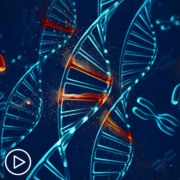Lung Cancer Patient Expert Q&A: Dr. Christina Baik from Patient Empowerment Network on Vimeo.
In this START HERE lung cancer webinar, Dr. Christina Baik, Associate Professor of Medicine at the University of Washington and Fred Hutchinson Cancer Center, provides valuable insights into priorities for newly diagnosed patients. Dr. Baik also discusses essential tools for managing disease progression and recurrence.
Watch the program and download the guide for tips on creating an actionable pathway to optimize lung cancer care for yourself or your loved one.
Download Resource Guide
See More from START HERE Lung Cancer
Related Resources:
Transcript:
Lisa Hatfield:
Hello and welcome. My name is Lisa Hatfield, your host for this Patient Empowerment Network Start Here program where we bridge the expert and patient voice to enable you and me to feel comfortable asking questions of our healthcare teams. The world is complicated, but understanding your lung cancer doesn’t have to be. The goal of this program is to create actionable pathways for getting the most out of lung cancer treatment and survivorship.
Today, I’m delighted and excited to welcome Dr. Christina Baik, a distinguished expert in the field of lung cancer. Dr. Baik serves as an associate professor in the Clinical Research Division at Fred Hutch. She also holds the position of clinical research director of thoracic head and neck oncology at University of Washington. Additionally, she has an associate professor, or she is an associate professor in the Division of Hematology and Oncology at the University of Washington School of Medicine. We’re so happy she’s joining us today. It’s a pleasure to have you with us, Dr. Baik.
Dr. Christina Baik:
Thank you for having me.
Lisa Hatfield:
Okay. Before we dive into today’s discussion, please take a moment to download the program Resource Guide using the QR code. This guide contains pertinent information to guide you both before and after the program. In this program, we’ll provide you with a comprehensive update on the latest lung cancer news and its implications for you and your family.
Following that, we’ll launch into questions we have received from you. So let’s start here. Dr. Baik, can you speak to the latest news and priorities for the treatment of non-small cell lung cancer? And what are the notable advancements in understanding resistance mechanisms or novel therapeutic targets?
Dr. Christina Baik:
So it’s a good time to be a lung cancer doc, I would say, just because there’s so much in advances. We’re seeing different treatments be FDA-approved every other year, if not every year. So it’s really good to have all these options to offer our patients. Now the priority, however, is that not everyone is benefiting in an equal way from all these advances. And really the research priority, including my own personal research, is to really understand why some patients are benefiting and why some are not.
So, for example, in the immunotherapy world, which is a big advance we’ve had in lung cancer in the last 10 years, we know that some patients respond very well, some do not. Yet we give the same sort of treatment to patients. So one thing to understand is who are…and one thing I would say is we don’t personalize immunotherapies for our patients.
So one of the research priorities is to really understand where the different subgroups of patients who are going to benefit from this one treatment type…one type of immunotherapy treatment versus the other. So I would say that’s a big priority for me as well as for the field and all the researchers so that we’re giving the right treatment to the right patient. Now, there have been advances, I would say, in this theme in those patients who are able to receive a targeted therapy. So that is a type of treatment that we give to target the genetic abnormalities that exist in a particular patient’s tumor.
And these treatments work very well. But at some point, it stops working. But nowadays, there are certain sorts of resistance mechanisms as we call it. These are changes that occur in the tumor when a targeted therapy stops working. And we’re starting to understand better in terms of reasons for that and actually develop treatment options for those mechanisms of resistance. So I think we are starting to understand better, and I think we’re going to get there in terms of personalizing immunotherapy. But there’s still a lot of work to be done.
Lisa Hatfield:
Great, thank you. So just a follow-up question to that, when a patient is diagnosed with non-small cell lung cancer,is genetic testing always done on the tumor, or do patients know what their mutations are right upon diagnosis if testing is done?
Dr. Christina Baik:
So, as a rule of thumb, they should, all patients should be tested, and there are exceptions. So, for example, in lung cancer, there’s the type that we call small cell lung cancer, and there’s non-small cell lung cancer. So we often, we usually do not do genetic testing on small cell lung cancer, because often these tumors do not have a genetic abnormality that for which we can actually give treatment for.
But for non-small cell patients, I would say, if most, my personal opinion is that everybody should be tested with the genetic test and really advocate for that. You know, there are certain types of non-small cell lung cancer where there are genetic targets that are rare, however, you don’t know unless you test. So I would say yes to that question of testing for genetic abnormalities.
Lisa Hatfield:
Okay, thank you. So can you speak to the priorities for newly diagnosed patients, particularly populations who may have poor outcomes?
Dr. Christina Baik:
So, I think there are priorities when it comes to research, and then there are priorities for individual patients, right? So from a research standpoint, as I mentioned before, I think really the priorities, the priority is to develop strategies so that we’re truly personalizing treatment for each patient, and we’re not giving this kind of generic treatment for a bulk of the patients. So from a research standpoint, really understanding the biology, understanding what works for what patient, I think that’s extremely important.
On the individual patient level, we sort of alluded to this earlier, but really knowing the cancer we’re dealing with is extremely important. Know your cancer stage, ask what your cancer stage is, know the type of lung cancer that you have. So I will say as of now, there are, I can think of 12 or 13 different types of lung cancer that I want to make sure I know that patients, you know, what their subtype is.
So know your subtype of lung cancer. Ask those questions. If the knowledge is not known, if they say, “You know your stage is not very clear, your subtype is not clear,” then ask why that is, what type of additional testing that needs to be done. So I think those are the type of questions that each patient and their family member should really ask. And in terms of the poor outcome question, I think the first thing I would say is if a doctor tells you, you belong to a group of patients who are going to have a poor prognosis, then ask why that is, right? And understand the reasons for that.
And if that’s, once you understand, I think I’m a big proponent of getting second opinions, because a lot of these treatments and there’s a lot of medical judgment involved when we recommend treatments, and you just want to get a different perspective with the same type or set of information. So really being an advocate for yourself, I think that’s extremely important when you’re first diagnosed.
Lisa Hatfield:
Great, thank you. You mentioned two things I also feel strongly about, I don’t have lung cancer, I have a different type of cancer, but you said that patients and family members can ask questions. Having an advocate with you at all times, if that’s possible, a family member, a friend going with you, I think is super important.
And also getting a second consult to understand your diagnosis better. I appreciate you saying that, because some of us are a little bit reluctant to do that, maybe afraid of offending our doctors. So, I appreciate that as a patient myself, so thank you. Okay. So talking about disease progression and recurrence, particularly for metastatic non-small cell lung cancer, what should patients know?
Dr. Christina Baik:
Okay. So when a cancer initially responds to a treatment and it stops responding, there can be many reasons for that. So the first question to really think about is is there another test we can do to identify the reason for the progression? And can we personalize a treatment according to that resistance pattern or the change that occurs in the tumor? This is more relevant to patients who get a targeted therapy, but I think it’s a good sort of rule of thumb in terms of asking your doctor why that is, and is there more testing that’s required. And the second I would say is once the cancer progresses after the initial treatment, then, unfortunately, in lung cancer the treatment options are much more limited, and the effectiveness is very limited as well.
So, it’s really at that juncture to really seek out clinical trials. There are many trials that are out there. So really working with your doctor in identifying these trials. If there is an academic center that’s close to you, at least inquiring about that. In lung cancer, fortunately, there are many wonderful advocacy groups and these advocacy groups can be great resources in finding out about clinical trials and where to seek out opinions. So, I think it does require some homework at the time of progression but really seek those out.
Lisa Hatfield:
Okay. Thank you. Now, if a patient does have an interest in a clinical trial, say maybe they have, their cancer has progressed, would they seek out that trial through the academic center itself? If, say they live in a rural area and they don’t have access, would they contact the academic center itself, or would they seek out a specialist like you first to ask about those clinical trials?
Dr. Christina Baik:
So they sort of come together in a way, because a lot of the specialists are in academic centers. So I think there are two ways to go about it. One is to meet with the specialist who can give you kind of the landscape of where things are and what might be appropriate. So, that’s one way to do it.
The other way to do it is if there’s a particular clinical trial that you’re really interested in based on discussions with other patients or through advocacy groups, if there are particular clinical trials, usually the contact information is listed on the clinicaltrials.gov website, and the contact number is usually for the research team who can give you more information about that particular trial.
Lisa Hatfield:
Okay. That’s very helpful, thank you. And thank you for this overview. I just want to recap a couple of points that you made that’s really important for patients to know. You had mentioned knowing their type, their subtype of lung cancer, knowing their stage, and knowing their mutations and having an advocate. I think those are all really great tips that you gave. So thank you for that overview. It’s that time now where we answer questions that we’ve received from you.
Please remember, this is not a substitute for your medical care. Always consult with your own medical team, and, Dr. Baik, we have some questions here that people have sent in from patients. So I’ll just jump right into the first question. “What exactly is oncogene-driven lung cancer, and how does it differ from the other types of lung cancer?”
Dr. Christina Baik:
So in lung cancer, there are certain lung cancers where the growth of the cancer is dependent on a particular genetic abnormality. So there is one gene that makes that cancer grow. And because of that, there have been treatments that are developed against that particular genetic abnormality. So, it is referring to lung cancers that have that particular genetic abnormality. A prime example of this is lung cancers that have what we call an EGFR mutation. That means that there is this gene called EGFR that is abnormal, and that’s making the cancer grow.
Now, not everyone has a cancer gene that is driving that cancer. I would say about 30 percent or for 30 percent to 40 percent of patients would have an oncogene-driven cancer for which there may be treatments either as a standard treatment or in clinical trials. But the majority of patients do not have an oncogene, meaning that genetic abnormality where there is a targeted therapy option. So that’s the distinction we make. And I know this term or phrase is used a lot, but that’s what it means. And if you want to know if one has an oncogene-driven lung cancer, you would know based on the genetic test results.
Lisa Hatfield:
Okay. Great. Thank you. And just for clarification too, the genetic mutations are found in the cancer cells, not in their body, the cells? So that’s what the genetic testing is done just on the cancer cells. Is that correct?
Dr. Christina Baik:
Yes. Yes.
Lisa Hatfield:
Okay, great.
Dr. Christina Baik:
Thank you for clarifying that. That’s a very important distinction.
Lisa Hatfield:
Yeah. Thank you. So that leads right into the next question, and it’s kind of a lengthy question. And this person is asking, “Dr. Baik, you have done considerable research around EGFR exon 20 insertion mutations in non-small cell lung cancer, considering their association with poor survival outcomes, what are the survival implications of having EGFR exon 20 insertion mutations compared to other types of EGFR mutations?”
Dr. Christina Baik:
Now this gets a bit complicated, but not all EGFR lung cancers are the same. And there are patients who have what we call EGFR mutation that is a classical mutation. And I throw out that term, because that’s how it’s written on the Internet and a lot of papers. And then, so that’s one group, and the other group are patients who have this exon 20 insertion mutation. And the reason these are separated is because the treatments that work very well in the classical mutations do not work very well in this particular exon 20 mutation.
So when we look at all patients with EGFR mutation, it is true that the prognosis is poor in exon 20 patients just because there are no great targeted therapy options. That said, I am very hopeful that this is changing. There are a number of targeted therapies for exon 20 that are in trials, and I think these are going to be FDA-approved in the future, not too far off in the future, I believe. So I think the survival implications will start to hopefully equalize amongst all the EGFR-mutated lung cancer patients.
Lisa Hatfield:
Okay. Another question, Dr. Baik, from a patient, “For someone who is newly diagnosed with non-small cell lung cancer, what should be the top priorities in understanding and navigating treatment options, especially if I’m in a group that tends to have poorer outcomes?”
Dr. Christina Baik:
So the really, the priorities, when someone is first diagnosed, is really understanding what we’re dealing with and know what they’re dealing with. Now, if you don’t have all this information, I think it’s extremely important to ask. And if you get an answer that indicates that it’s not very clear, and they don’t know, then ask why.
And what are some of the follow-up tests that need to be done so that you can really know. So, I think really the knowledge is extremely important. One thing that I will expand on is that patients, when they’re first diagnosed with non-small cell lung cancer, they should get testing of the cancer, the genetic testing of the cancer to identify the subtype.
And often, it can’t be completed because there’s a lack of biopsy material. So that is often a common situation. So, if that’s a common situation, then ask, “Is there room for another test? Should I get another biopsy? Is there a blood biopsy that will be helpful in this setting?” So really be an advocate for yourself to complete the testing, because the treatment options are drastically different, whether there’s a genetic target in the cancer or not.
The other thing I would say in terms of poor outcomes is that, if you’re told that you’re in a group that has poor outcomes, I think the first question would be to ask why. “Why am I in that group? What makes…what about the cancer that makes it a poor outcome?” And I think this is a setting where you do want to especially get a different opinion potentially just so that the other doctors also agree that you’re in that group. And if so, are there other treatments outside of the standard treatments that you can take advantage of so that it could potentially work better?
Lisa Hatfield:
Okay, thank you. So this patient mentioned that they are newly diagnosed. And I’m wondering if you can just in really general terms explain what treatment and monitoring might look like. For example, how often might this patient have to come in for treatment? What type of monitoring might be done? I know it has to be really general because every patient is so different. But can you just give a really kind of a high level overview of what that might look like for a newly diagnosed patient?
Dr. Christina Baik:
Yes. So I can speak for patients who have advanced non-small cell lung cancer, which is, unfortunately, still the majority of patients who are newly diagnosed. Most of them have advanced or metastatic lung cancer, meaning that the cancer has gone outside of the original area to other parts of the body. In those settings, if there is a genetic target on the cancer, often the treatment is a pill, which is great. And often, they are fairly tolerable, of course, there are exceptions, but for the most part it is a tolerable type of treatment. So for those patients who have a pill option and they’re tolerating it well, the pills are taken at home, right? They don’t have to come to a hospital for that.
Initially, at least in my personal practice, we do see patients fairly often just so that we can make sure the side effects are being managed and patients are doing well. So initially, it might be every other week type of visits for the first two or three sort of first visits, so the first month or two may be more frequent. But once we get to a point where the treatment is working and side effects are manageable, then I’m essentially seeing them every three months, and they can go. I have patients who travel internationally and just come check with me every three months or so.
So that’s one type of monitoring that we do and in this setting, we would get imaging often with CT scans, every three to four months or so, that number is not exact, there’s no science behind that three to four months. But we would…the point is that we will monitor the cancer using imaging, often with CT scans every three to four months in that setting. Now, and I do want to emphasize that that’s my own personal practice, every doctor does it a little bit differently in terms of intervals. Now, for patients who do not have a targeted therapy option, meaning there’s no pill option, then often patients are receiving some form of infusional treatment. And the infusional treatments vary in terms of the frequency. So some treatments are every three weeks, some are every four, some maybe every six.
Lisa Hatfield:
Okay, thank you. That’s helpful. So another question, which is a big concern for many patients, I’m sure. “What signs should I watch for that might indicate the cancer is coming back or progressing? And what steps can I take if I notice any concerning symptoms?”
Dr. Christina Baik:
Right. So the signs are often difficult to identify, mainly because the symptoms can be very similar to kind of normal symptoms, meaning so, for example, one thing we watch out for is back pain, for example, because we worry that the cancer may be going into the bone in the back. However, many of us have back pain chronically, so often it is difficult to tease out what’s what. That said, what I tell my own patients as a rule of thumb is if anything is persisting, so, for example, you have your usual back pain, you know that typically after some rest and some exercise it usually gets better after about a week. The severity may fluctuate a little bit, but most of muscle back pains will change or lighten up after some time if you strained it.
But if there’s a particular pain in a particular part of the body that is just not going away, that’s something to watch out for. Same thing with symptoms like cough, right? So I’ve had many patients who are diagnosed after COVID, where they would have this persistent cough after COVID, but they sort of blamed it on COVID and after a while, since it was not going away they sought medical care. So same thing there, if you had a viral infection, over time the cough should get better.
And if it’s not or if it’s getting worse, then we really have to…really need to investigate the reason for that. So anything that’s persistent, I would say that’s when you want to alert your team. What I tell my own patients is that just tell us, and we’ll figure it out for you or with you. Don’t try to kind of figure it out on your own. I do notice that I do have some patients who tell me that they feel bad about calling and “complaining,” right? And we tell them it’s not complaining, you’re just reporting to us, and we tell you it’s nothing to worry about just watch or something that you need to come in for. So really work closely with your oncology team.
Lisa Hatfield:
Okay, thank you. Well, that’s all the time that we have for today’s Start Here Lung Cancer program. Dr. Baik, you’ve been a phenomenal guest, thank you so much for sharing your experience and expertise with us.
Dr. Christina Baik:
Thank you so much. It’s been great.
Lisa Hatfield:
Yeah, we really appreciate your time. And thank you all for tuning in, it’s these conversations that make a world of difference for patients and their families, particularly when we can hear it from researchers on the ground floor. I’m Lisa Hatfield, and I’ll see you next time.
Share Your Feedback
Create your own user feedback survey







